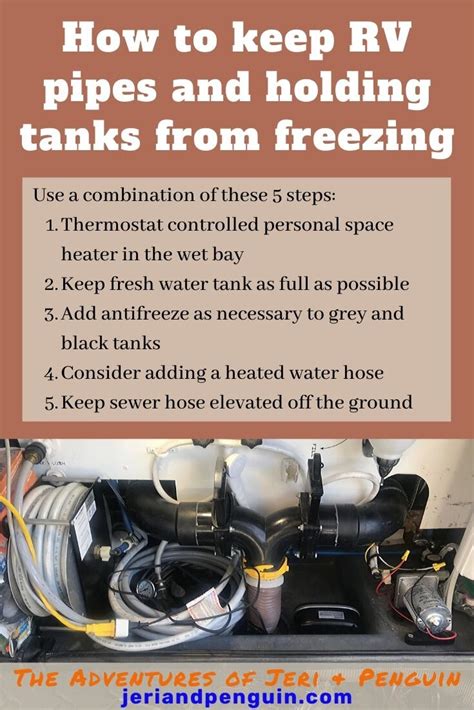How To Keep Water From Freezing In Rv
Ronan Farrow
Apr 01, 2025 · 3 min read

Table of Contents
How to Keep Water From Freezing in Your RV: A Comprehensive Guide
Winterizing your RV plumbing system is crucial to prevent costly damage from freezing temperatures. Frozen water expands, potentially bursting pipes and causing significant headaches (and expenses!). This guide provides comprehensive strategies to keep your RV's water system ice-free, ensuring worry-free winter adventures or safe storage.
Understanding the Risks of Frozen Pipes in RVs
Before diving into solutions, let's understand why freezing is so damaging. Water expands by about 9% when it freezes. This expansion puts immense pressure on your RV's plumbing system, which is often made of relatively thin-walled pipes. The result? Cracked or burst pipes, leading to leaks, water damage, and expensive repairs.
Identifying Vulnerable Areas
Some areas are more susceptible to freezing than others. These include:
- Exposed pipes: Any pipes located in exterior walls or underbelly storage compartments are especially vulnerable.
- Low-lying pipes: Gravity causes water to settle at the lowest points in your plumbing system, making these areas prime candidates for freezing.
- Pipes near vents: While vents are important for ventilation, cold air can infiltrate and freeze pipes nearby.
Proven Methods to Prevent RV Water Freezing
Here are effective strategies to protect your RV's water system from freezing temperatures:
1. Blow-Out Method: The Gold Standard
This is considered the most effective method, completely removing all water from the system. You'll need an air compressor capable of generating at least 30 PSI. Important: Always disconnect your water pump before starting.
- Step-by-Step: Connect the air compressor to a low-point drain, typically found near the water pump. Turn on the compressor and let the air purge the system until you see only air coming from all faucets and low-point drains.
- Advantages: Completely eliminates water, offering the best protection against freezing.
- Disadvantages: Requires an air compressor and some technical know-how.
2. Using RV Antifreeze (Propylene Glycol): A Reliable Alternative
RV antifreeze is non-toxic and specifically designed for protecting plumbing systems from freezing. Never use automotive antifreeze.
- Step-by-Step: Drain your water tank and then add the antifreeze to your system, running each faucet and low-point drain until you see pink antifreeze. This will coat the insides of your pipes.
- Advantages: Relatively easy to use and highly effective.
- Disadvantages: Requires purchasing antifreeze and flushing the system thoroughly in the spring.
3. Insulation: Adding an Extra Layer of Protection
Insulating vulnerable pipes and compartments significantly reduces the risk of freezing.
- Options: Use pipe insulation sleeves, foam insulation boards, or heat tape (with caution and proper installation) to protect exposed pipes and areas susceptible to freezing.
- Advantages: Provides added protection even with residual water in the system, affordable and readily available.
- Disadvantages: May not be sufficient in extremely cold temperatures unless combined with another method.
4. Keeping Your RV Heated: For Short-Term Protection
If you're using your RV in milder winter conditions or for short periods, keeping the interior temperature above freezing can prevent freezing in many cases.
- Options: Use a space heater (safely and with proper ventilation), leave the furnace on low, or even utilize electric heating pads wrapped around vulnerable pipes.
- Advantages: Simple and effective for short-term use.
- Disadvantages: Ineffective in extreme cold and increases energy consumption.
Maintaining Your RV's Water System
Regular maintenance is crucial to avoid problems:
- Inspect for Leaks: Regularly check your pipes for leaks and signs of damage.
- Flush Your System: Periodically flush your system to remove sediment and buildup.
- Winterize Properly: Always winterize your system thoroughly before prolonged exposure to freezing temperatures.
By following these strategies and prioritizing regular maintenance, you can safeguard your RV's plumbing system from freezing and ensure many enjoyable journeys ahead. Remember, prevention is always better than cure when it comes to freezing pipes!
Featured Posts
Also read the following articles
| Article Title | Date |
|---|---|
| How To Keep Crickets Out Of Garage | Apr 01, 2025 |
| How To Prepare For Morpheus8 | Apr 01, 2025 |
| How To Prepare For Abim Longitudinal Assessment | Apr 01, 2025 |
| How To Make Starbucks Pistachio Cold Foam | Apr 01, 2025 |
| How To Opt Back In To Text Messages | Apr 01, 2025 |
Latest Posts
Thank you for visiting our website which covers about How To Keep Water From Freezing In Rv . We hope the information provided has been useful to you. Feel free to contact us if you have any questions or need further assistance. See you next time and don't miss to bookmark.
